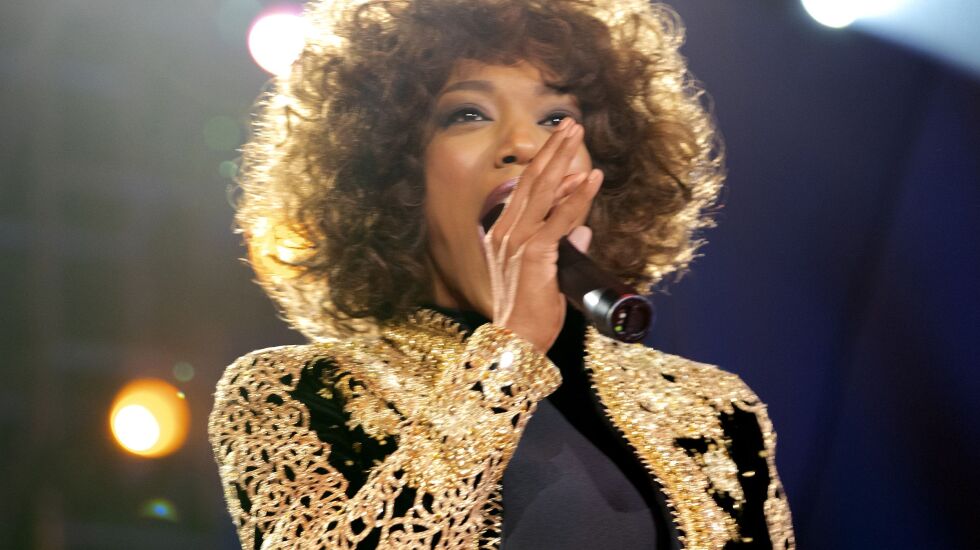
One could argue there wasn’t a pressing need for a Whitney Houston biopic, given that in the decade since Houston’s tragic passing at the age of 48, we’ve seen a plethora of TV specials, documentaries such as “Whitney: Can I Be Me?” and “Whitney,” the Lifetime biopic “Whitney” and a thinly veiled Netflix film called “Beauty” that was clearly inspired by Houston. And we can easily Google and find footage of Whitney’s iconic performances, from her TV debut on “The Merv Griffin Show” at age 18 through her legendary rendition of “The Star-Spangled Banner” at the 1991 Super Bowl to her live performance of a trio of songs at the 1994 American Music Awards, plus all those music videos…
And yet. In a year when both Marilyn Monroe and Elvis Presley were the subjects of factionalized biographies for the umpteenth time, why not Whitney? Unlike the dazzling and dizzying “Elvis” and the exploitative and nightmarish “Blonde,” director Kasi Lemmons’ “Whitney Houston: I Wanna Dance With Somebody” is the most straightforward, linear, by-the-numbers treatment imaginable — a veritable “Film-ipedia” entry that is more tribute than eulogy, more celebration than lamentation.
With astonishingly accurate re-creations of many of the touchstone performances in Houston’s career and a star-power performance from the British actor Naomi Ackie as Whitney, along with stellar supporting work from a reliable cast of veteran and familiar faces, “I Wanna Dance With Somebody” is a consistently entertaining biopic that rarely digs beneath the surface despite the 2 hour and 26 minute running time. Houston basically gets the “Bohemian Rhapsody” treatment in that the film glosses over some of the darkest moments in her life. (in fact, Anthony McCarten is the screenwriter of both films), but it works beautifully as a feature-film biography highlighting one of the most incredible voices and one of the most infectious star personalities of a generation.
After a brief prologue in which we see Whitney growing up in East Orange, New Jersey, in a house where her parents, John (Clarke Peters) and Cissy (Tamara Tunie) fought often and loudly, and Whitney meeting and becoming friends and eventually lovers with Robyn Crawford (Nafessa Williams), it’s time for the “Star is Born” moments. Cissy sets her own spotlight ambitions aside and arranges for Whitney to sing “The Greatest Love of All” at the New York nightclub Sweetwater’s with the legendary starmaker Clive Davis (Stanley Tucci, in full mensch-father-figure mode) in attendance, and just a couple of weeks later, Clive is introducing Whitney to Merv Griffin and a national TV audience, and when Whitney kills with a rendition of “Home” from “The Wiz,” she’s on her way to superstardom.
“I Wanna Dance With Somebody” has all the usual musical biopic moments, including the medley showing her racking up one No. 1 hit after another, moving into an outlandishly oversized mansion, singing in front of adoring crowds, etc., etc. Director Lemmons and the production design, costume and makeup artists do a fabulous job of re-creating the music video for “How Will I Know,” as well as Whitney’s show-stopping performance of the national anthem at the Super Bowl (though the crowd scenes and the fighter jets are obvious CGI creations).
As for the darker elements: While Whitney’s mother Cissy is controlling but clearly loving and supportive, her husband John abuses his position as Whitney’s manager all the way to his deathbed, where he demands to be paid. “I Wanna Dance Somebody” briefly touches on the controversy at the 1988 Soul Train Music Awards, where protesters claimed Houston was too bland and white-sounding.
Cue the entrance into the story of one Bobby Brown (Ashton Sanders, from “Moonlight”), a scurrilous player who latched onto Whitney for respectability, while she seemingly was drawn to him in order to gain some sort of street cred. We all know how destructive and awful that relationship turned out to be. But while we see Whitney getting wasted and we know the fate awaiting her, we don’t see anything as stark and alarming in the film as we saw in real life, e.g., Houston’s disastrous “Crack is whack” interview with Diane Sawyer.
Naomi Ackie doesn’t bear an obvious resemblance to Whitney Houston, yet she somehow channels her, especially in the performance scenes. The voice we hear is almost exclusively Houston’s; as Ackie put it in an interview, “97.9% of it is Whitney.” Still, when Ackie takes the stage and lip-syncs to Houston’s epic performance of “I Loves You Porgy,” “And I Am Telling You I’m Not Going” and “I Have Nothing” at the 1994 American Music Awards, it’s a soaring, triumphant sequence reminding us of why we loved Whitney Houston and why we wish she had been able to fend off those demons and continue to sing with the angels.







